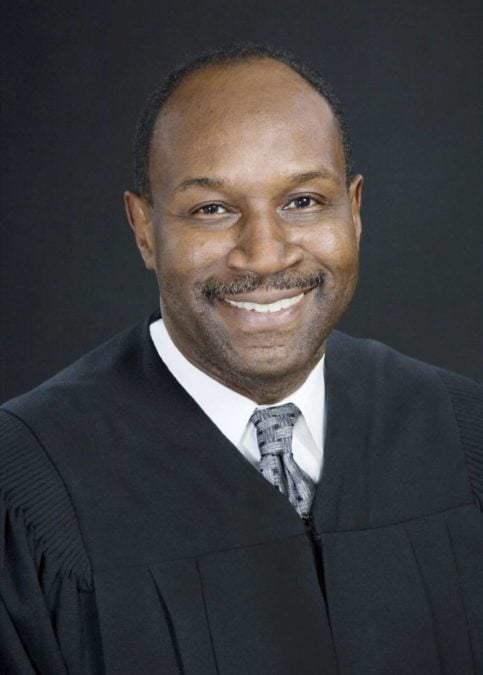
If approved, California Supreme Court nominee Martin Jenkins would be the third Black man and first gay person to sit on the state’s highest court in its 170-year history. Photo: Office of Gov. Gavin Newsom.
UPDATE: Martin Jenkins was confirmed. He thanked his partner in his acceptance speech.
Editorial
California Gov. Gavin Newsom made a historic announcement when he announced the nomination of Martin Jenkins as an Associate Justice on the Supreme Court of California.
Previously a justice of the California Court of Appeal for the First District, located in San Francisco, and a former United States district judge for the Northern District of California, Justice Jenkins most recently served as the judicial appointments secretary for Gov. Newsom.
A public hearing on Jenkins’ nomination will take place 1 p.m. Tuesday. The public can watch via the California Supreme Court webpage.
If confirmed by the California Commission on Judicial Appointments, Jenkins will be the first openly gay man to serve on the California Supreme Court. He will also be the first openly gay Black man to serve on any state supreme court in the U.S. Currently, only 11 openly LGBT justices serve on state supreme courts and one openly LGBT justice serves on the Puerto Rico Supreme Court.
Justice Jenkins started his legal career as a prosecutor in Alameda County, California. He soon moved to the U.S Department of Justice, working in the Civil Rights Division, where he was responsible for cases of police misconduct and racial violence, including prosecuting Ku Klux Klan members in the South. He started his judicial career as a municipal judge in 1989 and became a Superior Court judge before being appointed to the federal bench by President Bill Clinton in 1998. Justice Jenkins is well-known as fair and impartial judge committed to civil rights, as well as a mentor and role model to youth considering a career in the legal field.
Justice Jenkins’ appointment will bring experience and diversity to the court that is currently missing. Not only will Jenkins be the first openly gay man on the California Supreme Court, he will be the first Black man to serve on that court in almost 30 years.
Diversity among judges increases public confidence in the courts, which is understandably lacking among marginalized groups, including LGBT people. Lambda Legal’s 2014 survey of the experiences of LGBT people and people living with HIV, “Protected and Served?”, found that only 27% of the transgender respondents and 33% of the LGBT people of color respondents said they “trust the courts.”
When the court reflects the diversity of the population it serves, people become more assured that they will have a fair experience. Judicial diversity also brings enriched decision-making to the bench. Justice Jenkins described this during his appointment speech when he explained that his struggle with his identity “deepened (his) character and afforded (him) sensibilities about the world” that he otherwise would not have had.
During his appointment speech he spoke directly to LGBT youth explaining that his identity as a gay man has perhaps been his greatest struggle in life. His advice: “I want these young people to know that living a life of authenticity is the greatest gift you can give yourself.”
Justice Jenkins living openly and authentically is a gift he will bring to the California Supreme Court.
